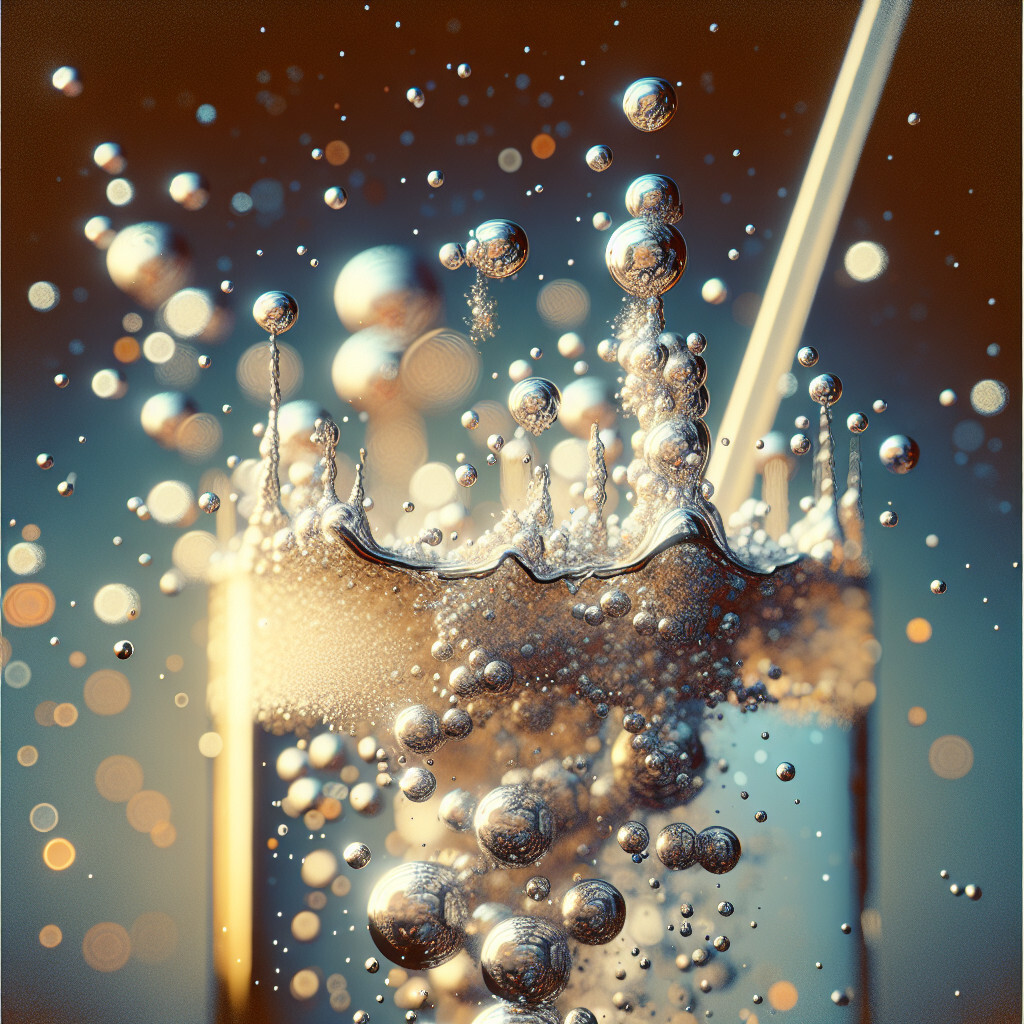-
Table of Contents
- Introduction
- Understanding the Impact of Seltzer Water on Dental Health
- Exploring the Connection Between Seltzer Water and Digestive Issues
- The Potential Risks of Seltzer Water on Bone Density
- Seltzer Water and Weight Gain: An Unseen Side Effect
- The Role of Seltzer Water in Calcium Depletion: A Comprehensive Study
- Q&A
- Conclusion
“Seltzer Water: Sparkling Hydration with a Fizz of Potential Side Effects.”
Introduction
Seltzer water, also known as sparkling water, is a popular beverage choice for many due to its refreshing taste and zero-calorie content. However, despite its benefits, it may also have potential side effects. These can include tooth decay due to its acidic nature, bloating and gas from the carbonation, and potential bone health issues due to its high phosphate content. Additionally, flavored seltzer water may contain artificial sweeteners which can lead to weight gain and other health problems. It’s important to consume seltzer water in moderation and be aware of these potential side effects.
Understanding the Impact of Seltzer Water on Dental Health

Seltzer water, also known as sparkling water, has gained significant popularity in recent years. Its refreshing taste and fizzy sensation make it a favorite among many, especially those seeking a healthier alternative to sugary sodas. However, as with any food or drink, it’s essential to understand the potential impacts on our health, particularly dental health.
Seltzer water is essentially water that has been carbonated, meaning it has been infused with carbon dioxide under pressure. This process gives the water its characteristic bubbles and fizz. While it may seem harmless, the carbonation process can potentially lead to some dental health concerns.
One of the primary concerns is the acidity of seltzer water. The carbonation process creates carbonic acid, which lowers the pH of the water, making it more acidic. Acidic foods and drinks can erode tooth enamel, the hard, protective outer layer of our teeth. Enamel erosion can lead to tooth sensitivity, discoloration, and an increased risk of cavities.
However, it’s important to note that not all seltzer waters are created equal. Some brands add citric acid or other flavorings to their seltzer water, which can further increase its acidity. Therefore, if you’re a frequent seltzer water drinker, it may be worth checking the ingredients list and opting for a brand without added acids or flavorings.
Another potential concern is the effect of seltzer water on dental erosion. Dental erosion is the loss of tooth structure due to chemical dissolution by acids not of bacterial origin. A study published in the Journal of Oral Rehabilitation found that while seltzer water is more erosive than regular water, it is far less erosive than other beverages such as soft drinks and fruit juices.
Despite these potential concerns, it’s important to remember that seltzer water is still a much healthier choice than sugary sodas and other sweetened beverages. The American Dental Association recommends limiting the consumption of sugary drinks to protect dental health, and seltzer water can be a good alternative.
To mitigate the potential dental health impacts of seltzer water, there are a few strategies you can employ. First, try to limit your consumption and drink it in one sitting rather than sipping on it throughout the day. This can help to limit the amount of time your teeth are exposed to the acids in the seltzer water.
Second, consider drinking seltzer water with a meal. Saliva production increases during meals, which can help to neutralize the acids and protect your teeth.
Lastly, avoid brushing your teeth immediately after drinking seltzer water. The combination of the acid in the seltzer water and the abrasion from brushing can be particularly damaging to tooth enamel. Instead, wait at least 30 minutes after drinking seltzer water before brushing your teeth.
In conclusion, while seltzer water can potentially have some impacts on dental health due to its acidity and potential for dental erosion, it is still a much healthier choice than sugary drinks. By being mindful of your consumption and employing strategies to protect your teeth, you can enjoy seltzer water without compromising your dental health.
Exploring the Connection Between Seltzer Water and Digestive Issues
Seltzer water, also known as sparkling water, has gained significant popularity in recent years. Its refreshing taste and fizzy sensation make it a delightful alternative to still water and sugary soft drinks. However, as with any food or beverage, it’s essential to understand the potential side effects that seltzer water may have on your health, particularly in relation to digestive issues.
To begin with, seltzer water is simply water that has been carbonated, meaning it has been infused with carbon dioxide under pressure. This process gives the water its characteristic bubbles and fizz. While this carbonation process doesn’t add any calories or sugar, it can potentially lead to some digestive discomfort.
One of the most common side effects of drinking seltzer water is bloating. The carbon dioxide that gives seltzer water its fizz can also cause a buildup of gas in your stomach. This can lead to feelings of bloating and fullness, which can be uncomfortable for some people. This effect is usually temporary and subsides once the gas is expelled from the body, either through burping or flatulence.
In addition to bloating, some people may experience heartburn or acid reflux after consuming seltzer water. The carbonation in the water can cause the stomach to produce more gastric acid, which can then rise up into the esophagus and cause a burning sensation. This is particularly true for individuals who already suffer from conditions like gastroesophageal reflux disease (GERD). However, it’s worth noting that not everyone will experience this side effect, and for many, seltzer water can be enjoyed without any discomfort.
Another potential side effect of seltzer water is its impact on dental health. While seltzer water is certainly a healthier choice than sugary sodas, the carbonation process does make it slightly acidic. Over time, this acidity can potentially erode tooth enamel, leading to cavities and other dental issues. However, this risk is relatively low, especially if you’re drinking plain seltzer water without any added flavors or sugars.
Despite these potential side effects, it’s important to remember that seltzer water is still a much healthier choice than many other beverages. It’s calorie-free, sugar-free, and can help you stay hydrated. Plus, the fizziness can make it feel like a treat, which can help you resist the temptation of less healthy options.
In conclusion, while seltzer water can potentially cause some digestive discomfort and has a slight impact on dental health, these side effects are generally mild and temporary. As with any food or drink, moderation is key. If you find that seltzer water causes you discomfort, it may be best to limit your intake or switch to still water. However, for most people, seltzer water can be a refreshing and healthy part of their diet. Always listen to your body and make dietary choices that support your overall health and wellbeing.
The Potential Risks of Seltzer Water on Bone Density
Seltzer water, also known as sparkling water, has gained significant popularity in recent years. Its refreshing taste and fizzy sensation make it a delightful alternative to still water and a healthier substitute for sugary sodas. However, as with any food or beverage, it’s essential to consider the potential side effects of seltzer water. One area of concern that has been raised is the potential impact of seltzer water on bone density.
Bone density refers to the amount of mineral matter per square centimeter of bones. It is a crucial aspect of our health, as low bone density can lead to conditions like osteoporosis, which makes bones more susceptible to fractures. Some studies suggest that carbonated beverages, including seltzer water, might negatively affect bone health. The primary concern is that the carbonation in these drinks could lead to calcium loss in bones, thereby reducing bone density.
The theory behind this concern is that the carbonation in seltzer water might increase the body’s acidity levels. In response, the body might draw calcium from the bones to neutralize this acidity, leading to a decrease in bone density. However, it’s important to note that this theory is based on the assumption that seltzer water has the same effect on the body as other carbonated beverages, like soda.
Soda, particularly cola, has been linked to lower bone density. But the reason for this is likely not the carbonation, but rather the high levels of phosphoric acid found in colas. Phosphoric acid can interfere with the body’s ability to absorb calcium, leading to lower bone density. Seltzer water, on the other hand, does not contain phosphoric acid, making it a safer choice in this regard.
Moreover, research has shown that the consumption of carbonated beverages, including seltzer water, does not directly lead to a decrease in bone density. A study published in the American Journal of Clinical Nutrition found no significant link between carbonated beverage consumption and bone mineral density in men or women. Instead, the study suggested that the lower bone density observed in soda drinkers might be due to their lower intake of calcium-rich beverages, like milk.
While these findings are reassuring, it’s still important to consume seltzer water in moderation. Like any beverage, it should not replace nutrient-rich drinks entirely. For instance, while seltzer water can be a refreshing choice on a hot day or a satisfying substitute for soda, it should not replace calcium-rich beverages like milk or fortified plant-based alternatives.
In conclusion, while there has been some concern about the potential impact of seltzer water on bone density, current research suggests that it does not pose a significant risk. However, as with any food or beverage, moderation is key. It’s also important to maintain a balanced diet rich in calcium and vitamin D, engage in regular weight-bearing exercise, and avoid smoking and excessive alcohol to promote overall bone health. So, feel free to enjoy your fizzy seltzer water, but remember to keep your overall health in mind.
Seltzer Water and Weight Gain: An Unseen Side Effect
Seltzer water, also known as sparkling water, has gained significant popularity in recent years. Its refreshing taste and fizzy sensation make it a favorite among many, especially those seeking a healthier alternative to sugary sodas. However, like any other food or drink, seltzer water may have potential side effects that consumers should be aware of. One such side effect that has been a topic of discussion is its possible link to weight gain.
Seltzer water is essentially water that has been carbonated, meaning it has been infused with carbon dioxide under pressure. This process gives the water its characteristic bubbles and fizz. It’s important to note that plain seltzer water does not contain any calories, sugars, or artificial sweeteners, making it a seemingly harmless beverage choice. However, the carbonation in seltzer water can lead to a feeling of fullness or bloating, which may indirectly contribute to weight gain.
The sensation of fullness that comes from drinking seltzer water can cause people to eat less during a meal. While this might sound like a good thing for those trying to lose weight, it can actually have the opposite effect. When you don’t eat enough at meal times, you’re more likely to snack between meals, which can lead to an overall increase in calorie intake. Additionally, the bloating caused by seltzer water can make physical activity uncomfortable, potentially leading to a decrease in exercise and subsequent weight gain.
Another factor to consider is the acidity of seltzer water. The carbonation process makes seltzer water more acidic than regular water, which can lead to tooth enamel erosion if consumed in large amounts. This is particularly concerning for those who regularly drink flavored seltzer water, as these often contain citric acid for flavoring, further increasing the drink’s acidity. While this doesn’t directly contribute to weight gain, it’s an important side effect to be aware of, as oral health is an integral part of overall health.
It’s also worth noting that not all seltzer waters are created equal. Some brands add sugars, artificial sweeteners, or flavorings to their seltzer water, which can certainly contribute to weight gain. For instance, a can of flavored seltzer water can contain as many calories and sugars as a can of soda. Therefore, it’s crucial to read the labels carefully and choose plain seltzer water or those flavored naturally with fruit essences.
In conclusion, while seltzer water is a healthier alternative to sugary drinks, it’s not without potential side effects. The carbonation can lead to feelings of fullness and bloating, which may indirectly contribute to weight gain. Additionally, the acidity of seltzer water can potentially harm tooth enamel, especially in flavored varieties. As with any food or drink, moderation is key. It’s perfectly fine to enjoy a glass of seltzer water now and then, but it’s important to balance it with regular water intake, a healthy diet, and regular exercise.
The Role of Seltzer Water in Calcium Depletion: A Comprehensive Study
Seltzer water, also known as sparkling water, has gained significant popularity in recent years. Its refreshing taste and effervescence make it an appealing alternative to still water, particularly for those who are trying to reduce their intake of sugary drinks. However, as with any food or beverage, it’s important to consider the potential side effects of seltzer water. One area of concern that has been the subject of numerous studies is the role of seltzer water in calcium depletion.
Calcium is a vital mineral that plays a crucial role in maintaining the health of our bones and teeth. It also aids in nerve function, muscle contraction, and blood clotting. Therefore, any factor that could potentially deplete the body’s calcium levels is a cause for concern. Some studies suggest that the carbonation in seltzer water could lead to calcium depletion, thereby increasing the risk of osteoporosis and other bone-related health issues.
The theory behind this concern is that the carbonation in seltzer water can increase the acidity of the blood. To neutralize this acidity, the body may draw calcium from the bones, leading to a decrease in bone density over time. This is particularly concerning for individuals who are already at risk for osteoporosis, such as postmenopausal women.
However, it’s important to note that the research on this topic is not conclusive. While some studies have found a link between carbonated beverages and lower bone density, others have found no such association. Furthermore, many of the studies that did find a link were looking at soft drinks, which contain phosphoric acid in addition to carbonation. Phosphoric acid has been shown to interfere with calcium absorption, which could explain the observed decrease in bone density.
In contrast, seltzer water does not typically contain phosphoric acid. Therefore, it’s possible that the negative effects observed in studies of soft drinks may not apply to seltzer water. In fact, a study published in the American Journal of Clinical Nutrition found no association between carbonated water consumption and decreased bone mineral density in men or women.
Despite these findings, it’s still a good idea to consume seltzer water in moderation. While it may not directly lead to calcium depletion, it can still contribute to other health issues if consumed in excess. For example, the carbonation can lead to bloating and gas, and flavored varieties often contain added sugars or artificial sweeteners.
In conclusion, while seltzer water can be a refreshing and healthier alternative to sugary drinks, it’s important to consume it in moderation. The potential link between seltzer water and calcium depletion is not yet fully understood, and more research is needed to draw definitive conclusions. In the meantime, if you’re concerned about your calcium intake, consider incorporating more calcium-rich foods into your diet, such as dairy products, leafy greens, and fortified foods. And as always, it’s a good idea to discuss any dietary concerns with a healthcare professional.
Q&A
1. Question: Can seltzer water cause digestive issues?
Answer: Yes, seltzer water can cause bloating and gas due to its carbonation.
2. Question: Does seltzer water affect bone health?
Answer: No, there is no scientific evidence to suggest that seltzer water negatively affects bone health.
3. Question: Can seltzer water lead to weight gain?
Answer: No, seltzer water itself does not cause weight gain as it is typically calorie-free. However, flavored or sweetened varieties may contain added sugars which could contribute to weight gain.
4. Question: Can seltzer water damage teeth?
Answer: Yes, the acidity in seltzer water can potentially erode tooth enamel over time, especially if consumed in large amounts.
5. Question: Does seltzer water cause dehydration?
Answer: No, seltzer water does not cause dehydration. It can actually contribute to your daily hydration needs.
Conclusion
In conclusion, while seltzer water is generally safe for consumption, it may have possible side effects including tooth decay due to its acidity, bloating and gas from carbonation, and potential bone health issues due to its high phosphorus content. It may also lead to weight gain and increased heart disease risk if it contains added sugars or artificial sweeteners.







